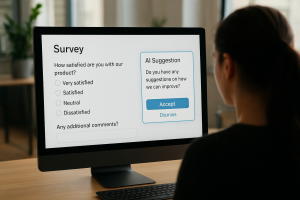Explore how Inqqa AI transforms survey data by integrating open-ended questions with advanced text analysis.
Introduction
Survey design is experiencing a transformation as open-ended questions converge with sophisticated AI tools like Inqqa AI. Open-ended questions cultivate a wide range of responses that, when examined through AI text analysis, uncover deeper insights. Implementing AI in surveys not only diversifies data but also engenders more engaging feedback. This article delves into how the integration of Inqqa AI with open-ended questions is set to revolutionise the landscape of survey insights.
The Role of AI in Dynamic Data Collection
Colin Ho, Global Chief Research Officer at Ipsos, underscores AI’s transformative capability: “While AI can be used to develop surveys more efficiently… the ability to use LLM to evolve surveys into a more dynamic and interactive data collection tool is the most promising and exciting possibility.” These tools, utilising real-time interactions and follow-up questions through LLM-based chatbots, significantly enhance engagement. This dynamic approach improves data collection, allowing respondents to articulate comprehensive thoughts and hence enrich the quality of insights. Such tools adapt responsively to users’ inputs, generating a customised survey experience.
AI’s Impact on Survey Efficiency
AI is fundamentally redesigning survey creation and execution. Recent studies suggest, “AI is revolutionising survey creation—but not by replacing researchers. Instead, it’s empowering them to work faster, smarter, and with greater confidence in the quality of their outputs.” Combining AI with human expertise enables researchers to craft surveys that are both efficient and impactful, allowing for quicker adaptations to keep surveys relevant
Overcoming Challenges with Open-Ended Questions
Despite its advantages, AI utilisation with open-ended questions introduces challenges, such as potential biases in AI-generated outputs. Human oversight, as is crucial in reviewing and validating AI outputs to mitigate biases. Human oversight ensures AI outputs align with research goals and ethical standards. Additionally, continuous monitoring and updating of AI models are essential to accommodate evolving language and cultural contexts.

Customising Survey Tools for Enhanced Insights
Customising AI tools to fit specific survey needs is vital. As survey methods advance, harnessing AI for intuitive interfaces and user-friendly designs becomes critical. However, wit AI that can approximate human interviewers, translate and analyse unstructured text data with ease, this seems like the right moment to evolve surveys. This strategy enables researchers to steer survey development, ensuring questions yield the most pertinent insights. Tailoring AI tools to suit specific scenarios enhances survey effectiveness
The Future of AI in Survey Design
As AI progresses, the future of surveys appears poised for transformation. Employing open-ended questions on AI-driven platforms unlocks the potential for richer data. We need to design surveys with the end in mind. AI doesn’t always see that bigger picture. Balancing AI’s efficiency with maintaining the survey’s fundamental purpose is crucial. Moreover, as AI’s capabilities expand, real-time data analysis and continuous feedback will further refine the survey process.
Enhancing Survey Outcomes
Strategically combining open-ended questions with AI tools like Inqqa AI can significantly enhance survey insights. By remaining vigilant and capitalising on AI’s potential for dynamic data collection, researchers can optimise survey results. As AI continues to integrate into the field, achieving a balance between human insight and technological efficiency will be essential for extracting valuable information from complex data sets. The future likely promises more seamless AI integration, unlocking new avenues for innovation and insight in survey research.
To experience the capabilities of Inqqa.AI firsthand, request a free trial on the Inqqa website or reach out to any of our experts for more information.
